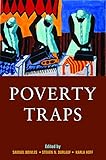Poverty traps / edited by Samuel Bowles, Steven N. Durlauf, and Karla Hoff.
Material type: TextPublication details: New York : Russell Sage Foundation ; Princeton, N.J. : Princeton University Press, ©2006.Description: 1 online resource (vi, 241 pages) : illustrationsContent type:
TextPublication details: New York : Russell Sage Foundation ; Princeton, N.J. : Princeton University Press, ©2006.Description: 1 online resource (vi, 241 pages) : illustrationsContent type: - text
- computer
- online resource
- 9781400841295
- 1400841291
- 339.4/6 22
- HC79.P6 P695 2006eb
| Item type | Home library | Collection | Call number | Materials specified | Status | Date due | Barcode | |
|---|---|---|---|---|---|---|---|---|
 Electronic-Books
Electronic-Books
|
OPJGU Sonepat- Campus | E-Books EBSCO | Available |
Includes bibliographical references and index.
The theory of poverty traps: what have we learned? / Costas Azariadis -- The persistence of poverty in the Americas: the role of institutions / Stanley L. Engerman, Kenneth L. Sokoloff -- Parasites / Halvor Mehlum, Karl Moene, Ragnar Torvik -- The kin system as a poverty trap? / Karla Hoff, Arijit Sen -- Institutional poverty traps / Samuel Bowles -- Groups, social influences, and inequality / Steven N. Durlauf -- Durable inequality: spacial dynamics, social processes, and the persistence of poverty in Chicago neighborhoods / Robert J. Sampson, Jeffrey D. Morenoff -- Spatial concentration and social stratification: does the clustering of disadvantage "beget" bad outcomes? / Michael E. Sobel.
Online resource; title from PDF title page (JSTOR, viewed November 21, 2016).
Much popular belief--and public policy--rests on the idea that those born into poverty have it in their power to escape. But the persistence of poverty and ever-growing economic inequality around the world have led many economists to seriously question the model of individual economic self-determination when it comes to the poor. In Poverty Traps, Samuel Bowles, Steven Durlauf, Karla Hoff, and the book's other contributors argue that there are many conditions that may trap individuals, groups, and whole economies in intractable poverty. For the first time the editors have brought tog.
eBooks on EBSCOhost EBSCO eBook Subscription Academic Collection - Worldwide
There are no comments on this title.

